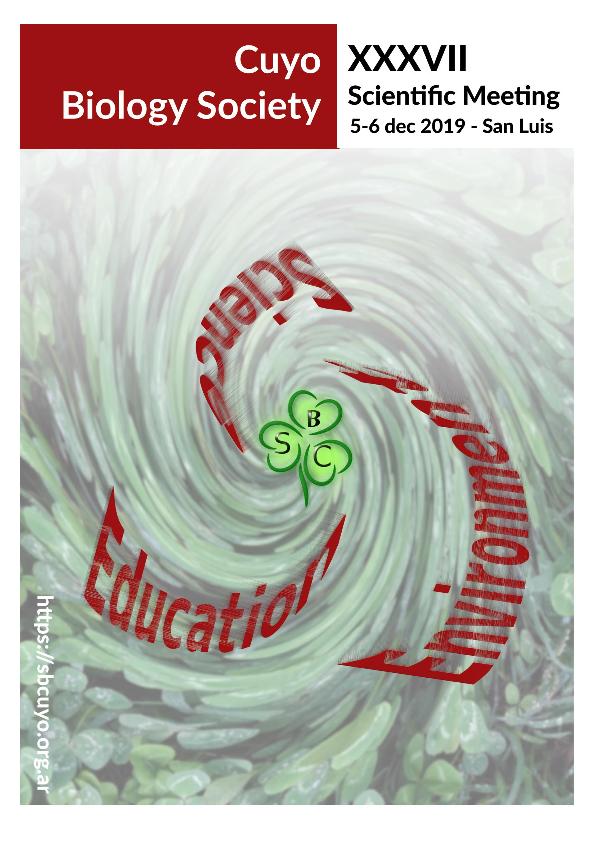Mostrar el registro sencillo del ítem
dc.contributor.author
Pereyra, Laura Lucia

dc.contributor.author
Peralta, S.
dc.contributor.author
Cunietti, Martín
dc.contributor.author
Vargas Roig, Laura Maria

dc.contributor.author
Sosa, M. A.
dc.contributor.author
Carvelli, Flavia Lorena

dc.date.available
2023-08-07T14:08:40Z
dc.date.issued
2020
dc.identifier.citation
Chloroquine alters expression and distribution of cation-dependent mannose 6-phosphate receptor of breast cancer cells; XXXVII Reunión Científica Anual de la Sociedad de Biología de Cuyo; San Luis; Argentina; 2019; 17-17
dc.identifier.issn
0327-9545
dc.identifier.uri
http://hdl.handle.net/11336/207182
dc.description.abstract
Breast cancer is one of the most important causes of morbidity and mortality worldwide. Several tumoral cells have increased their lysosomal biogenesis in response to metabolic alterations, which also has an impact on the integrity and/or lysosomal functionality, showing increased levels of lysosomal proteases, such as cathepsin D (CatD). CatD was reported to induce apoptosis when is released into the cytoplasm. Since the lysosomes could play a role either as initiators or executors of apoptotic processes when the membrane integrity is altered, this organelle could be taken as a potential therapeutic target against tumors. Lysosomal proteases are delivered by mannose-6-phosphate receptors (cation dependent, CD-MPR, and independent-, CI-MPR) from the trans-Golgi to late endosomes, where enzyme-receptor complexes are dissociated and the receptor recycled. Chloroquine (CQ) is a lysosomotropic agent that prevents endosomal acidification. It accumulates inside the acidic compartments and it is used as a potent adjuvant when combined with antitumoral drugs. The aim of this study was to evaluate the effect of CQ on the lysosomal protease endocytic pathway through the CD-MPR behavior in breast cancer cells. Tumorigenic mammary cell line MCF-7 was incubated with CQ for 12 h. Cultures were subjected to immunoblot analysis and IFI. We observed an increased expression of CD-MPR by the treatment. Moreover, the receptor is redistributed from a perinuclear region to a punctuated cytoplasmic detection. In addition, mature CatD form was decreased by the treatment. Our results suggest that CD-MPR-containing compartments are affected by CQ, possibly leading to an impeded CatD trafficking and processing.
dc.format
application/pdf
dc.language.iso
eng
dc.publisher
Tech Science Press

dc.rights
info:eu-repo/semantics/openAccess
dc.rights.uri
https://creativecommons.org/licenses/by/2.5/ar/
dc.subject
BREAST CANCER
dc.subject
CD-MPR
dc.subject
CHLOROQUINE
dc.subject.classification
Bioquímica y Biología Molecular

dc.subject.classification
Ciencias Biológicas

dc.subject.classification
CIENCIAS NATURALES Y EXACTAS

dc.title
Chloroquine alters expression and distribution of cation-dependent mannose 6-phosphate receptor of breast cancer cells
dc.type
info:eu-repo/semantics/publishedVersion
dc.type
info:eu-repo/semantics/conferenceObject
dc.type
info:ar-repo/semantics/documento de conferencia
dc.date.updated
2023-02-23T14:01:54Z
dc.identifier.eissn
1667-5746
dc.journal.volume
44
dc.journal.number
Suppl. 1
dc.journal.pagination
17-17
dc.journal.pais
Estados Unidos

dc.journal.ciudad
Henderson
dc.description.fil
Fil: Pereyra, Laura Lucia. Consejo Nacional de Investigaciones Científicas y Técnicas. Centro Científico Tecnológico Conicet - Mendoza. Instituto Histología y Embriología D/mend Dr.m.burgos; Argentina
dc.description.fil
Fil: Peralta, S.. Consejo Nacional de Investigaciones Científicas y Técnicas. Centro Científico Tecnológico Conicet - Mendoza. Instituto Histología y Embriología D/mend Dr.m.burgos; Argentina
dc.description.fil
Fil: Cunietti, Martín. Consejo Nacional de Investigaciones Científicas y Técnicas. Centro Científico Tecnológico Conicet - Mendoza. Instituto Histología y Embriología D/mend Dr.m.burgos; Argentina
dc.description.fil
Fil: Vargas Roig, Laura Maria. Consejo Nacional de Investigaciones Científicas y Técnicas. Centro Científico Tecnológico Conicet - Mendoza. Instituto de Medicina y Biología Experimental de Cuyo; Argentina
dc.description.fil
Fil: Sosa, M. A.. Consejo Nacional de Investigaciones Científicas y Técnicas. Centro Científico Tecnológico Conicet - Mendoza. Instituto Histología y Embriología D/mend Dr.m.burgos; Argentina. Universidad Nacional de Cuyo. Facultad de Ciencias Exactas y Naturales; Argentina
dc.description.fil
Fil: Carvelli, Flavia Lorena. Consejo Nacional de Investigaciones Científicas y Técnicas. Centro Científico Tecnológico Conicet - Mendoza. Instituto Histología y Embriología D/mend Dr.m.burgos; Argentina. Universidad Nacional de Cuyo. Facultad de Ciencias Exactas y Naturales; Argentina
dc.relation.alternativeid
info:eu-repo/semantics/altIdentifier/url/https://www.techscience.com/biocell/v44nSuppl.1/39488
dc.conicet.rol
Autor

dc.conicet.rol
Autor

dc.conicet.rol
Autor

dc.conicet.rol
Autor

dc.conicet.rol
Autor

dc.conicet.rol
Autor

dc.conicet.rol
Autor

dc.coverage
Nacional
dc.type.subtype
Reunión
dc.description.nombreEvento
XXXVII Reunión Científica Anual de la Sociedad de Biología de Cuyo
dc.date.evento
2019-12-05
dc.description.ciudadEvento
San Luis
dc.description.paisEvento
Argentina

dc.type.publicacion
Journal
dc.description.institucionOrganizadora
Sociedad de Biología de Cuyo
dc.source.revista
Biocell

dc.date.eventoHasta
2019-12-06
dc.type
Reunión
Archivos asociados
